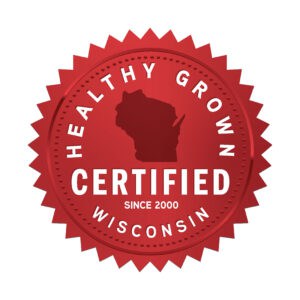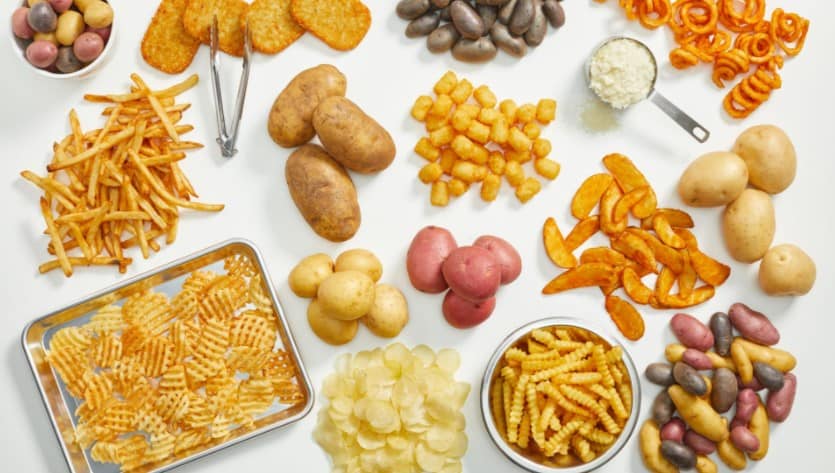Wisconsin-grown Potatoes Add a Splash of Color this Season
By: Jenny Heap MS, RDN
Baked, roasted, scalloped, mashed, or smashed, potatoes are a hallmark of the holiday table. Have you ever noticed the eye-catching array of potato sizes, shapes and colors in the produce section and wanted to try them all? With the season in full swing, we’ve gathered some favorite seasonal recipes that promise to bring a spectrum of color and an array of nutritional benefits and flavor to your holiday table.
Nutrition Overview:
Vibrant with color – red, yellow, purple, blue (and yes, even white!)—potatoes not only make for beautiful dishes, but they all boast an impressive array of nutrients. Potatoes provide vitamin C, potassium, fiber, and polyphenols – phytonutrients that may exert antiviral, anti-inflammatory,
anti-carcinogenic, hypoglycemic, and other beneficial effects.1 In fact, potatoes are responsible for 25% of Americans’ consumption of polyphenols from the vegetable category.2 While purple and red-fleshed varieties are highest in anthocyanins, white and yellow-fleshed potatoes are higher in flavonols.
Russet
Best for: Baking, Frying, Mashing, Roasting
Available: Year-round
Texture: floury, dry; light and fluffy; hearty skin that is chewy when cooked.
Skin: hearty; chewy when cooked
Flavor: mild; earthy
With a dry, floury texture and delicate flavor, Russets are ideal for making the lightest, fluffiest mashed potatoes and oh-so-toppable baked potatoes. They easily bake or fry to a light, crisp, golden brown, making them a go-to for many professional and home chefs.
White
Best for: Frying, Mashing, Steaming, Salads
Available: Year-round
Texture: medium starch; slightly creamy, slightly dense
Skin: thin, delicate
Flavor: mild and subtly sweet
Peak Season: available year-round
The thin, delicate skin of white potatoes makes them ideal for skin-on recipes, adding light texture and subtle dimensional color variations to mashed potatoes. Because white potatoes hold their shape well after cooking, they are perfect for cool salads and scalloped preparations, and grilling, which brings out a more full-bodied flavor.
Yellow
Best for: Grilling, Roasting, Mashing, Salads Texture: slightly waxy, smooth and buttery, moist Skin: delicate, light tan to golden skin
Flavor: rich; buttery; subtly sweet
Peak Season: available year-round
Yellow potatoes’ dense flesh makes them great for grilling and salads. Grilling crisps the skin and slightly sweetens their flavor. With the smooth, creamy texture of yellow potatoes, you might even omit the butter and not even miss it. Yellow varieties also lend themselves well to smashed and crisped recipes.
Red
Best for: Roasting, Mashing, Salads, Soups/Stews
Texture: waxy, moist and smooth; creamy
Skin: thin, red
Flavor: subtly sweet
Peak Season: available year-round
Red potatoes tend to hold their shape and maintain firmness after cooking, making them an excellent choice for salads, soups, and stews. The thin skin adds subtle texture and the vibrant color, which comes from beneficial anthocyanins in the skin, is a beautiful addition to any dish. Red potatoes are similar in nutrient content to other potatoes but add some choline to the mix. A medium red potato baked with skin provides 33 mg, or 6% of the daily value for choline.
Purple and Blue
Best for: Roasting, Grilling, Steaming, Salads, Baking
Texture: moist; firm flesh. Note–blue and purple Peruvian varieties have higher starch content and a floury texture
Skin: thin to semi-thick
Flavor: earthy, nutty
Peak Season: fall and winter, but available year-round
Flesh can be blue, purple lavender, pink or white. Most have firm flesh and maintain their shape well after cooking. Though they can be prepared in many ways, microwaving is the method that best retains the purple color. Their mild, nutty flavor makes them a perfect complement to green salads. Purple and blue potatoes are rich in anthocyanins, phytonutrients that act as antioxidants, fight inflammation, and are responsible for their vibrant colors.3 Anthocyanins are concentrated mainly in the skin, so be sure to include the peel to get all of the benefits.
Fingerling
Best for: Pan-frying, Roasting, Salads
Texture: waxy, firm, dry
Skin: delicate
Flavor: buttery; nutty; earthy
Fingerling potatoes are loved for their array of vibrant colors—red, orange, purple, and white—and their variety of shapes both oblong and slender. Their petite size makes them easy to use and cut lengthwise, preserving their colorful skins for visual appeal. They are favorites for roasting and pan frying, which brings out their natural, full-bodied flavor. Anthocyanins give purple-skinned fingerlings their vibrant hue.
Though there are countless potato varieties in the world (over 4500 according to the International Potato Center), potatoes grown in the United States fit into a few major categories: Russet, yellow, red, white, blue and purple, and fingerling. Multiple varieties in each category are grown locally in Wisconsin. In fact, when it comes to potato cultivation and research, Wisconsin is a center of innovation for the world of potatoes and home to top researchers who test and develop new potato varieties at Wisconsin’s outstanding potato research and breeding stations at Hancock and Rhinelander.
Wisconsin potato growers are committed to developing and adopting advancements in sustainable production practices. Farmers representing over 90% of the potato-growing acreage in Wisconsin are actively participating in implementation of new sustainability practices that support soil, water, and energy conservation, preservation of biodiversity, economic diversity and stability, food quality and safety standards, and community development. Wisconsin’s Healthy Grown certified farms go even further to pass annual whole-farm audits, ensuring the highest standards of sustainability.
When you choose Wisconsin-grown potatoes, you are…
- Choosing to eat
- Optimizing
- Choosing potatoes grown with the highest standards of
- Supporting the local economy by supporting local businesses
- Strengthening your community by supporting local, multigenerational farm
- Reducing the carbon footprint necessary to get potatoes from the field to your
Explore all of the potato varieties grown in Wisconsin at wisconsinpotatoes.com.
Content produced in partnership with the Wisconsin Potato and Vegetable Growers Association. Wisconsin Potato and Vegetable Growers Association represents growers committed to good agriculture, food safety, nutrition, traceability and providing America with fresh, high-quality produce.
Wisconsin-grown potatoes offer more than just great taste. Local and sustainably sourced, they’re
packed with nutrition no matter the variety. Every one of our Healthy Grown® farms is certified by an independent oversight organization. They ensure our growers pass annual Healthy Grown Potatoes and Vegetables whole-farm audits, and that all our packers and shippers maintain the highest sustainability standards.
Look for the Wisconsin Healthy Grown® certification on your potatoes!



